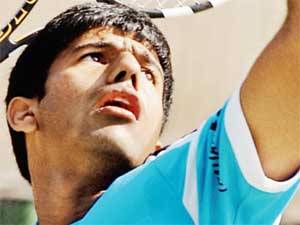Rohan Bopanna, at 34, is the most experienced member of the Indian Davis Cup team. He’s also back on the pro circuit with his most successful doubles partner Aisam-ul-Haq Qureshi. Off the court, his marriage to Supriya Annaiah is just over a year old.

He chats with Shamya Dasgupta about the calm after a stormy few years for the tennis player.
You’ve had 11 years in the pro circuit now. Do you think you have achieved what you set out to do?
Looking back, if someone told me that I would one day be the most senior representative on the Indian Davis Cup team and reach a career high of World No 3 (in men’s doubles), I would have found it hard to believe. It has been a journey of sacrifices and determination, which have, fortunately, paid off. I would say I have achieved most of what I set out to when I decided to take up the game, though I would still like to lead India to laurels on the global stage (in the Davis Cup) and also win a Grand Slam title, or many.
A question you would have fielded before—why do Indians make better players in the doubles game as compared with the singles game?
I don’t think there’s a tennis player in the world, who when he picks up the racquet for the first time and decides to be a professional, wants to be a doubles specialist. It is only later on in your career that you decide, based on your skills and your game, and choose to be a doubles specialist. I guess, in India, it is also due to the lack of sponsors that you choose the doubles route, an option that is financially viable.
You’re back with Aisam—what makes the two of you such a strong doubles team? Indeed, what makes any two individuals play well together?
There are a lot of factors that account for a great doubles pairing. Most important, I believe, is great chemistry on and off the court. Aisam and I have been close friends, having spent so many years on the circuit in proximity. I think that is a significant contribution to our success, apart from our understanding of each other’s game and each other’s strengths and weaknesses, again on court and off court. Drawing parallels to a marriage, which is my other significant partnership these days, I would say that all partnerships need work, effort and commitment.
Do you think you, and Aisam of course, became sacrificial lambs, so to say, in the 2011-12 period because of ‘issues’ between other people (Leander Paes and Mahesh Bhupathi)?
I can only speak for myself here and not for Aisam—well, it was I who decided to play with Mahesh and not Aisam in 2012 keeping the focus on representing the country and the London Olympics. And looking back at the on-court success, 2012 was definitely one of the best so far in my career. Off-court controversies are in the in the past and as players, you live, learn and move on as mature individuals. My focus is now on the year ahead and I am looking forward to it.
Would you say, because of the way things panned out, no one really benefited in that period, not Leander or Mahesh, nor you or Aisam, or even Sania Mirza?
I do not think anyone who genuinely cared about the sport benefited from the issues at that point of time. But, we have moved on. But, there’s a chance a similar issue might crop up before the 2016 Olympics. I am focused on the current year and not looking that far ahead.
Moving on, the International Tennis Premier League is also around the corner. What do you think the ITPL will do for you, and for tennis as a whole?
I’m really looking forward to being part of the ITPL. It will be a great opportunity to play along with and against some of the biggest names in the sport. I hope that it propels the interest for the game and boosts the viewership across Asia.
You are the most experienced player in the Indian Davis Cup team at the moment. What does that mean to you?
It is a fairly young team that we have currently representing the country at the Davis Cup. All of the guys are enthusiastic about making the country proud and, for me, it is a great opportunity to try and help them and pass on what my experiences in the game have taught me.
The reunion with Aisam has already brought you a title in Dubai. You and Aisam are the same age, so how far do you think the two of you can go?
The win in Dubai was gratifying and we hope to continue with the success from that win. We would like to play together for a couple of years at the very least, with a Grand Slam victory a priority.
(The author is Senior Editor at Wisden India)
source: http://www.articles.economictimes.indiatimes.com / The Economic Times / Home> News> Sports / ET Bureau / by Shyama Dasgupta / April 05th, 2014

